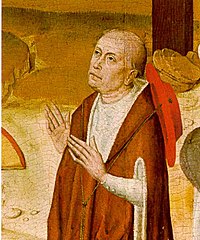Nikolaus von Kues
| Nicholas of Cusa | |
|---|---|

Nicholas of Cusa, by Master of the Life of the Virgin
|
|
| Born | 1401 Kues, Electorate of Trier, Holy Roman Empire |
| Died | 11 August 1464 Todi, Umbria, Papal States |
| Other names | "Nicolaus Chrypffs", "Nicholas of Kues", "Nicolaus Cusanus" |
| Alma mater |
Heidelberg University University of Padua |
| Era | Medieval philosophy, Renaissance philosophy |
| Region | Western philosophy |
Nicholas of Cusa (1401 – 11 August 1464), also referred to as Nicholas of Kues and Nicolaus Cusanus, was a German philosopher, theologian, jurist, and astronomer. One of the first German proponents of Renaissance humanism, he made spiritual and political contributions in European history. A notable example of this is his mystical or spiritual writings on "learned ignorance," as well as his participation in power struggles between Rome and the German states of the Holy Roman Empire.
Papal legate to Germany from 1446, he was appointed cardinal for his merits by Pope Nicholas V in 1448 and Prince–Bishop of Brixen two years later. In 1459 he became vicar general in the Papal States.
Nicholas of Cusa has remained an influential figure. During the period 2000-2001, his sixth centennial of his birth was celebrated on four continents and commemorated by publications on his life and work.
Nicholas was born in Kues (Latinized as "Cusa") in southwestern Germany. He was the second of four children of Johan Krebs (or Cryfftz) and Katherina Roemer. His father was "a prosperous boat owner and ferryman." He entered the Faculty of Arts of the Heidelberg University in 1416 as "a cleric of the Diocese of Trier", studying the liberal arts. He seemed to have left Heidelberg soon afterwards, as he received his doctorate in canon law from the University of Padua in 1423. In Padua, he met with the later cardinals Julian Cesarini and Domenico Capranica and became friends with the mathematician Paolo dal Pozzo Toscanelli. Afterwards, he entered the University of Cologne in 1425 as "a doctor of canon law," which he appears to have both taught and practiced there. In Cologne, he made friends with the scholastic theologian Heymeric de Campo.
...
Wikipedia
